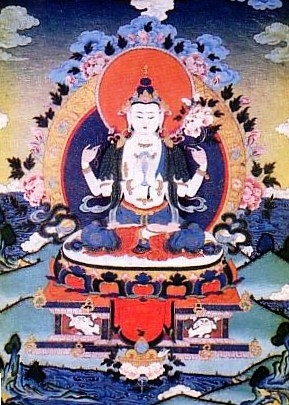Mani mantra: Difference between revisions
Jump to navigation
Jump to search
(added Mani Kulwa) |
|||
| Line 11: | Line 11: | ||
Padmasambhava said:<ref>In Jewels of Enlightenment - Wisdom teachings from the great Tibetan masters, compiled and translated by Erik Pema Kunsang; edited by Marcia Binder Schmidt & Michael Tweed (Boston: Shambhala, 2003)</ref><br> | Padmasambhava said:<ref>In Jewels of Enlightenment - Wisdom teachings from the great Tibetan masters, compiled and translated by Erik Pema Kunsang; edited by Marcia Binder Schmidt & Michael Tweed (Boston: Shambhala, 2003)</ref><br> | ||
:Om Mani Padme Hung is the quintessence of the Great Compassionate One, so the merit of uttering it just once is incalculable. It is possible to count the number of raindrops falling during twelve years of monsoon, but the merit of uttering the Six Syllables just once cannot be counted. It is possible to count the drops of water in the great ocean, one by one, but the merit of uttering the Six Syllables just once cannot be counted. | :Om Mani Padme Hung is the quintessence of the Great Compassionate One, so the merit of uttering it just once is incalculable. It is possible to count the number of raindrops falling during twelve years of monsoon, but the merit of uttering the Six Syllables just once cannot be counted. It is possible to count the drops of water in the great ocean, one by one, but the merit of uttering the Six Syllables just once cannot be counted. | ||
==Notes== | |||
<small><references/></small> | |||
==Further Reading== | ==Further Reading== | ||
| Line 16: | Line 19: | ||
*[[Dilgo Khyentse Rinpoche]], Patrul Rinpoche, ''The Heart Treasure of the Enlightened Ones'' (Boston: Shambhala, 1993) | *[[Dilgo Khyentse Rinpoche]], Patrul Rinpoche, ''The Heart Treasure of the Enlightened Ones'' (Boston: Shambhala, 1993) | ||
== | ==External Links== | ||
*[[Dodrupchen Jikmé Tenpé Nyima]], [https://aribhod.org/wp-content/uploads/2018/05/Mani_Kulwa_5-7-18_.pdf The Mani Kulwa - The Hook of Sorrowful Disillusionment, Verses of Encouragement to Recite the Mani Mantra] | |||
[[Category:Mantras]] | [[Category:Mantras]] | ||
Revision as of 08:36, 16 November 2023

The Mani mantra is the six syllable mantra of Avalokiteshvara: oṃ mani padme hūṃ (Skt.; Tib. ཨོཾ་མ་ཎི་པདྨེ་ཧཱུྂ༔, om mani pémé hung, Wyl. oM ma Ni pad+me hU~M`:). In the terma tradition, Avalokiteshvara's seed syllable hrīḥ is added to the end of the mantra, making seven syllables.
Benefits of the Mani Mantra
It is said:
- Reciting oṃ mani padme hūṃ one hundred or one thousand times is of equal merit to reciting the whole of the Kangyur.
- Reciting oṃ mani padme hūṃ ten thousand times closes the door to rebirth in the lower realms.
- Reciting oṃ mani padme hūṃ one million times one will reach the level of an irreversible bodhisattva.
- Reciting oṃ mani padme hūṃ ten million times one will attain perfect buddhahood.
Padmasambhava said:[1]
- Om Mani Padme Hung is the quintessence of the Great Compassionate One, so the merit of uttering it just once is incalculable. It is possible to count the number of raindrops falling during twelve years of monsoon, but the merit of uttering the Six Syllables just once cannot be counted. It is possible to count the drops of water in the great ocean, one by one, but the merit of uttering the Six Syllables just once cannot be counted.
Notes
- ↑ In Jewels of Enlightenment - Wisdom teachings from the great Tibetan masters, compiled and translated by Erik Pema Kunsang; edited by Marcia Binder Schmidt & Michael Tweed (Boston: Shambhala, 2003)
Further Reading
- Sogyal Rinpoche, The Tibetan Book of Living and Dying, Appendix Four, pages 396-398.
- Dilgo Khyentse Rinpoche, Patrul Rinpoche, The Heart Treasure of the Enlightened Ones (Boston: Shambhala, 1993)